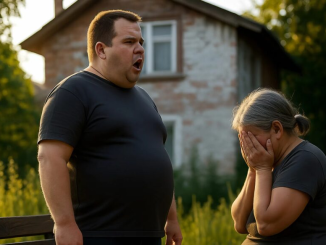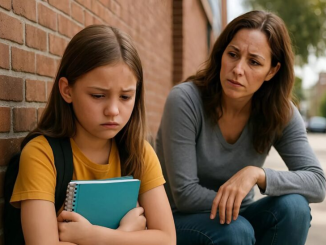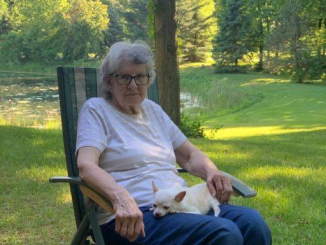
I’d never planned to run a marathon. Not at sixty-one. Not with two surgeries under my belt, three rounds of chemo, and a hip that creaked louder than the floorboards in my childhood home. But there I was—bib number 14489 pinned slightly off-center on my shirt, standing at the very edge of the starting corral, watching younger, faster bodies stretch and bounce like they were made of elastic.
Anne, what are you doing? I asked myself for the hundredth time.
But I knew the answer. I was here because I’d made a promise. A quiet one to myself, and a louder one to my daughters. After the diagnosis, I’d said I just wanted to survive. But after the remission, survival wasn’t enough. I wanted to live like I meant it.
So when I mentioned the marathon over dinner one night—half-joking, really—I hadn’t expected anything but polite laughter and maybe a “Mom, please.”
Instead, Nina, my youngest, had looked at me and said, “Then let’s do it. We’ll help you train.”
And they did. For six months, we walked, then jogged, then shuffled. My strides were small, my pace embarrassing, but each step felt like a rebellion against everything that had tried to stop me.
Race day came. Nina and her best friend Celine, who ran like wind and always smelled faintly of eucalyptus and determination, had started in the first wave. I insisted they go ahead—I didn’t want anyone slowing down for me.
The first ten miles passed in a haze of music, high-fives, and cardboard signs that made me smile. “You’re running better than the government!” one read. Another, “If Trump can run, so can you.” I chuckled, even as my legs began to burn.
But by mile 16, my smile had faded. The sun was too high, my energy too low. Runners zipped past me like I was standing still. I walked. Then jogged. Then walked again.
By mile 18, I thought about quitting. A water station volunteer handed me a cup and gave me a look that said, “Bless her heart.” I nodded weakly and pressed on.
That’s when I saw her.
She was just ahead, ponytail swinging, shoulders slumped. She looked young—twenties, maybe—but there was something in her gait that mirrored mine. Tired. Stubborn. When she turned and noticed me, she slowed. Waited. And without a word, held out her hand.
I hesitated.
But something about her steadiness calmed me. I took her hand.
We didn’t speak. We just… moved. She matched my steps, shared her water, pulled me gently whenever I faltered. At mile 22, my knee buckled. I cursed under my breath. She stopped and knelt, pulling a compression bandage from her pocket like she’d done this a hundred times.
“You’re prepared,” I finally said.
She gave me a lopsided grin. “I made a promise.”
That word—promise—lodged itself in my ribs.
We pressed on. Each mile slower than the last. The crowds thinned until it was just us, a few volunteers with kind eyes, and a police car creeping behind us like a patient shepherd.
By mile 25, my vision blurred with tears and sweat. My breath came in shallow gasps. I wanted to stop. Every cell in my body begged me to.
“I can’t,” I whispered.
“You can,” she said. “We’re not stopping until we cross. You promised, remember?”
I blinked. “How do you know that?”
She didn’t answer.
She just squeezed my hand tighter.
And we kept going. One stubborn step after another.
When we reached the finish line, the official clock was long off. The photographers had packed up. The medals were gone.
But my daughters were there—tears streaming, arms wide.
And Celine was not.
That’s when it clicked.
I turned to the woman beside me. “You’re not Celine.”
She shook her head, her smile soft. “No.”
“But you knew about the promise.”
She nodded. “Your girls wanted someone with you. Someone who could make sure you finished. Celine couldn’t be here. Her flight got delayed.”
I stared at her. “So you…?”
“They called me,” she said simply. “I run races. I coach sometimes. Celine said you were stubborn and kind and wouldn’t want help—but would take it if it was quiet.”
“Do you even know my name?”
She laughed. “Anne, right?”
I laughed too, though it came out as more of a sob.
I’d crossed the finish line. I’d done it.
The woman stepped back, letting my daughters engulf me. I turned to thank her again, but she was already walking away—just another runner among the stragglers, disappearing into the sunset.
Later, at dinner, Nina handed me something wrapped in tissue paper. Inside was a medal—one they’d bought on Etsy, engraved with the date and my finish time, down to the second.
“We figured they might run out by the time you got there,” she teased.
I laughed until I cried.
That night, alone in bed, I thought about the stranger who had held my hand for eight miles, who had known the exact kind of help I needed, and offered it without asking for anything in return.
Sometimes, the people who change your life aren’t the ones you’ve known forever. Sometimes, they’re the ones who show up, silently, in your hardest moment—and keep you moving forward.
I finished that marathon for me. But I didn’t do it alone.
And I’m starting to realize… maybe that was the point all along.
Would you hold a stranger’s hand if it meant helping them cross their finish line?






Leave a Reply